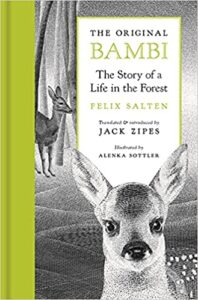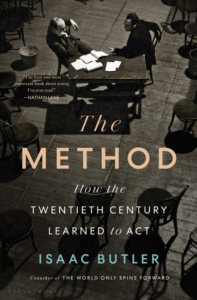
Our basket of brilliant reviews this week includes Zadie Smith on Toni Morrison’s Recitatif, Ron Charles on Olga Tokarczuk’s The Books of Jacob, Bill McKibben on Felix Salten’s The Original Bambi, Evan Kindley on Isaac Butler’s The Method, and Yiyun Li on Jon McGregor’s Lean Fall Stand.
“Much of the mesmerizing power of Recitatif lies in that first definition of ‘peculiar to’: that which characterizes. As readers, we urgently want to characterize the various characteristics on display … [it contains] one of the most stunning paragraphs in all of Morrison’s work. The psychological subtlety of it. The mix of projection, vicarious action, self-justification, sadistic pleasure, and personal trauma that she identifies as a motivating force within Twyla, and that, by extrapolation, she prompts us to recognize in ourselves … Morrison wants us ashamed of how we treat the powerless, even if we, too, feel powerless. And one of the ethical complexities of Recitatif is the uncomfortable fact that even as Twyla and Roberta fight to assert their own identities—the fact that they are both ‘somebody’—they simultaneously cast others into the role of nobodies … Morrison…could parse the difference between the deadness of a determining category and the richness of a lived experience. And there are some clues in this story, I think. Some hints at alternative ways of conceptualizing difference without either erasing or codifying it … Morrison is the great master of American complexity, and Recitatif, in my view, sits alongside ‘Bartleby, the Scrivener’ and ‘The Lottery’ as a perfect—and perfectly American—tale, one every American child should read.”
–Zadie Smith on Toni Morrison’s Recitatif (The New Yorker)
“The Books of Jacob is finally available here in a wondrous English translation by Jennifer Croft, and it’s just as awe-inspiring as the Nobel judges claimed when they praised Tokarczuk for showing ‘the supreme capacity of the novel to represent a case almost beyond human understanding.’ In terms of its scope and ambition, The Books of Jacob is beyond anything else I’ve ever read. Even its voluminous subtitle is a witty expression of Tokarczuk’s irrepressible, omnivorous reach … The challenges here—for author and reader—are considerable. After all, Tokarczuk isn’t revising our understanding of Mozart or presenting a fresh take on Catherine the Great. She’s excavating a shadowy figure who’s almost entirely unknown today … As daunting as it sounds, The Books of Jacob is miraculously entertaining and consistently fascinating. Despite his best efforts, Frank never mastered alchemy, but Tokarczuk certainly has. Her light irony, delightfully conveyed by Croft’s translation, infuses many of the sections … The quality that makes The Books of Jacob so striking is its remarkable form. Tokarczuk has constructed her narrative as a collage of legends, letters, diary entries, rumors, hagiographies, political attacks and historical records … This is a story that grows simultaneously more detailed and more mysterious … Haunting and irresistible.”
–Ron Charles on Olga Tokarczuk’s The Books of Jacob (The Washington Post)

“The concentration of literary firepower in fin de siècle Vienna has few counterparts in human history…It’s wonderfully ironic that the cultural production of this milieu that eventually reached the widest audience is a talking-animal story … Salten is an excellent naturalist. He describes the way Bambi learns to listen and smell, capturing the hyperalertness that is the birthright of prey … It’s a pretty brutal meditation on existence, serving as a kind of wild counterpart to Orwell’s domesticated animals on the Farm. And it’s easy to imagine how it came to the mind of a man who’d achieved success but was nonetheless a Jew in a part of the global forest where that made survival a challenge. (Salten fled to Switzerland when the Nazis rose to power.) There are plenty of compensations along the way, though: the love of mother and mate, and the beauty of the place. That beauty must have been a balm in the 1920s, when Salten was writing—a salve against the turbulence of interwar Europe, with Bolshevism and fascism threatening all … It’s true that the world has staggered on; we’ve figured out ways to survive, so far, the traumas that surrounded Salten. But he had the solace, at least, of seeing the natural world as a stable and static backdrop for the harsh dramas of the human world. A century later, we know that ‘He’ is deep in the forest all the time.”
–Bill McKibben on Felix Salten’s The Original Bambi: The Story of a Life in the Forest (The New York Times Book Review)

“The rest of Stanislavski’s career would be devoted to specifying this ‘something else.’ He would go on to devise a set of theories and techniques he called ‘the system,’ which would mutate, after being imported to the United States, into ‘the Method,’ and completely transform American theater and film. In his search, Stanislavski introduced the idea that great acting is not a matter of personal charisma or divine inspiration but of intellectual rigor and critical intelligence. What kind of preparation is necessary, he asked, to achieve ‘a state of living within the “very middle of an imagined life”‘? Stanislavski’s ultimate importance lies not in the specific answers he arrived at so much as in the fact that he believed the question could be answered at all. By his own lights, he stumbled on as many wrong ideas as he did right ones in the course of his investigations; what is strange is that, over a century later, no one seems to agree which ones are which … Even as he catalogs the Method’s many flaws and abuses, Butler is reverent about the history he records, and more than makes the case for the Method’s salutary effect on twentieth-century acting. About its modern-day legacy, he’s a bit more sanguine. Clearly, the ideas of Stanislavski and his successors have helped several generations of actors to think about their craft and take it seriously; along the way, it has helped inspire some transcendent performances. But the ‘Method’ mindset, as it has evolved since De Niro, has increasingly made a fetish of individual mastery in ways that are antithetical to the collaborative spirit of both the Moscow Art Theatre and the Group Theatre.”
–Evan Kindley on Isaac Butler’s The Method: How the Twentieth Century Learned to Act (The New Republic)
“To attune to the sensitivity of McGregor’s words—each sentence, each clause, each punctuation mark (or lack thereof)—a reader has to slow down to a near stillness, almost as if holding one’s breath in and one’s finger out to be touched by a hummingbird’s beak … We are, in these chapters, close to the researchers’ consciousnesses, which creates a false hope: surely the novel will let us see all of them return home safely and share this adventure with their families and friends … McGregor’s depiction of speechlessness, both metaphorical and physical, makes the novel much more interesting than if he had provided a page-turner about a botched expedition in Antarctica. Though most of us might not have firsthand experience of that continent, we are familiar with its often majestic stock images: the ocean, the sky, the ubiquitous ice, penguins, humans with special equipment that grants them access to the landscape. Such a place might prompt a cliché—at a loss for words—as might tragedies of all kinds (and perhaps blisses of all kinds). But anyone tempted to speak that phrase carelessly, as though it could convey something substantial, would perhaps reconsider after reading Lean Fall Stand. What does it mean for someone to be truly at a loss for words? … McGregor’s carefully composed dialogue, filled with the repetition of so few words, had an eerie effect on me: for several days my own inner dialogue was often composed of the same words, as though I, too, was discovering how they could express drastically different emotions yet remain unreadable to the world.”
–Yiyun Li on Jon McGregor’s Lean Fall Stand (The New York Review of Books)


